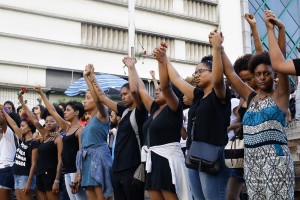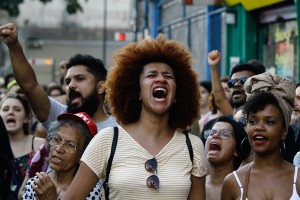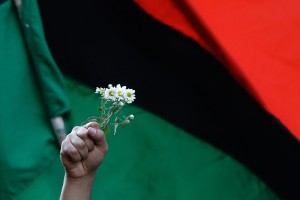By Carla Rodrigues
Can a subaltern speak? The response of the feminist philosopher Gayatri Spivak is no when she realizes that to “have the right to a voice” the place of the subaltern must be subverted. I will use this question to think about a few of the paradoxes that characterize the execution of the Municipal Councilwoman Marielle Franco.
Marielle has written and published quite extensively. In a footnote of one of her articles, I read that her activism against state violence — this phenomenon that kills black persons and other people who live in the favelas on a daily basis– began when her best friend was assassinated in a shooting in the community known as Complexo da Maré, where she lived. It is my supposition that this death was traumatic, not searching for a psychological interpretation – which, for various reasons, I am not allowed to –, but rather pulling the thread of the political perspective attributed by Jacques Derrida to the notion of trauma, in his interpretation of 9/11. Trauma in this political sense is what throws us into the unbearable fear of the future. Because something unspeakable has happened, anything can happen.
The young Marielle trailed the necessary path to overcome her subordinate status: she attended a community preparatory school for accessing the university: a local project established to overcome the historical barrier of social inequality in the access to higher education, especially for those who live in a favela. Then, she attained a Social Sciences degree at Pontifical Catholic University in Rio de Janeiro (PUC) and subsequently defended a Masters’ dissertation on Public Administration at the Federal Fluminense University (UFF). The question that must be answered is: Why all these accomplishments were not sufficient for her to subvert her subaltern position? Here lies the central point of my argument. The perversity of the racist structure in Brazilian society makes us believe that Marielle has been executed because there is nothing a black woman can do to alter her condition of subalternization, vulnerability and, ultimately, of being disposable.
Last year, 42 people were murdered in the Maré Complex. If Marielle was an anonymous woman amongst its 140,000 residents she could have been, potentially, one of these victims, as her young friend was. But she was not. Her political election as a councilman was imagined as the possibility for many others to escape the trap of systematic extermination of poor and black people in this city, in this country, on this continent.
The beautiful black woman who had become a representative of this city and the image of its resistance was executed after leaving an event named “Young black women moving the structures”, a conversation that was not about finger-pointing to individual responsibilities (this is the topic for another article). Marielle, whose mandate should have granted her parliamentary immunity – this privilege so deeply desired by other types of politicians – has died because she made her cabinet in the City Council a locus of resistance. Her politics combined vulnerability and resistance in a potent equation: she chose not to mobilize vulnerability to resist, maybe because she knew that empowering black women was more important than emphasizing their vulnerability, which is exactly what enemies do. She died because her capacity to resist made her vulnerable.
 The scene of her public memorial at Cinelandia Square glaringly expressed the unequal distribution of public mourning. While a crowd of anonymous people mourned her death, the city appeared to have left aside its usual apathetic and ordinary state. Young black feminist activists kept flowing to the square, while no mayor, governor or any representative from the federal government was present to mourn the departure of a councilwoman who was voted by 46,000 citizens. It was as if, even being a parliamentarian and as a city representative – therefore deserving an official declaration of mourning from all governmental levels – Marielle, now dead, was not authorized to leave behind the social markers that constituted her as a lesbian, born in the favela, a black woman, the same markers that serve to normalize the state violence against these lives in the name of protecting others.
The scene of her public memorial at Cinelandia Square glaringly expressed the unequal distribution of public mourning. While a crowd of anonymous people mourned her death, the city appeared to have left aside its usual apathetic and ordinary state. Young black feminist activists kept flowing to the square, while no mayor, governor or any representative from the federal government was present to mourn the departure of a councilwoman who was voted by 46,000 citizens. It was as if, even being a parliamentarian and as a city representative – therefore deserving an official declaration of mourning from all governmental levels – Marielle, now dead, was not authorized to leave behind the social markers that constituted her as a lesbian, born in the favela, a black woman, the same markers that serve to normalize the state violence against these lives in the name of protecting others.
The public memorial “Marielle is present” was a recognition that her life matters. Although it matters as much as all the many other lives brutally lost in Brazil’s daily genocide, one must also ask why is it that Marielle’s life can be mourned, while others cannot? So many others have gone anonymously each and every day, which are seen as mere individual losses for their families. Hence the importance of being on the streets, as it happened Tuesday, March 20th, at the public ecumenical act celebrated seven days after her death. Hence the urgent need to recover the connections between mourning and the state of exception, as elaborated by philosopher Giorgio Agamben. The mourning for Marielle is also the mourning for all the murders that preceded her assassination.
It seems essential to repeat, as to go beyond it, the argument of Michel Foucault that racism is what authorizes the state to kill. Marielle’s struggle was twofold, in the same manner that the work of mourning her will be double for us. Firstly, we must continue protesting and contesting the alleged authorization to kill. Then, it is still necessary to confront crime within the state, because Rio de Janeiro now under military intervention is the best example of the accurate diagnosis elaborated by the op-ed writer Vinicius Freire: “We have taken for granted the institutionalization of crime that dominates whole sectors of the public security and prison systems and has taken over the seats of city councillors and even the cabinets of town halls.” What does the institutionalized crime in the state, in general, and in the state of Rio de Janeiro, in particular, aim exactly is a hard political question for which we do not have an answer.
Last but not least, Marielle’s execution was taken fifty years after the murder of student Edson Luís in March 1968. That year has become known in Brazil as a never-ending year, the rise of popular revolts against his death by the Rio de Janeiro State Military Police would culminate in the Institutional Act Number 5 (AI-5) and, as consequence, in the resurgence of dire repression, whether in the form of a criminal state, or in the form of crime within the state. 2018 has barely begun and it has already begun badly. From the sentiment of political trauma that has sparked of in Brazil in 2013, now revised, the only certainty we can extract is that we do not have any guarantee of a future. For the time being, all we know is that female black subalterns cannot yet speak.
—
Carla Rodrigues is an Ethics Professor at the Philosophy Department at the Rio de Janeiro Federal University and a researcher of Feminist Theory.
Access here the original version in Portuguese previously published at Projeto Colabora.
Image credit: Demonstrators carry out act after Councillor Marielle Franco on Paulista Avenue in Sao Paulo, on Sunday, 18 March 2018. Marielle Franco and your driver Anderson Pedro Gomes, were shot dead on Wednesday night 14 March 2018, in the central region of the city of Rio de Janeiro. (Photo by Fabio Vieira/FotoRua/NurPhoto)


